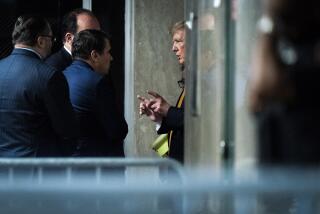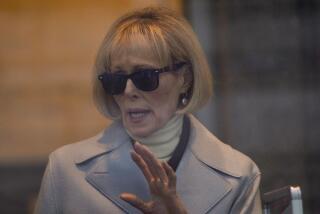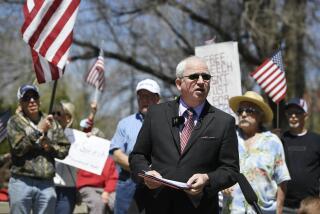North Lawyers Renew Bid for Reagan to Testify : Judge Declines to Rule but Legal Sources Say Ex-President May Have to Appear
- Share via
WASHINGTON — Attorneys for Oliver L. North renewed their request Friday to compel former President Ronald Reagan to testify at the fired White House aide’s trial, amid growing indications that the former President eventually will have to take the witness stand in the Iran-Contra case.
U.S. District Judge Gerhard A. Gesell declined to make an immediate ruling on the brief motion by North’s defense but legal sources close to both sides of the case said that they expect Reagan will be required to appear at some point.
The six weeks of testimony in the trial have provided more substantial grounds for questioning the former President about his instructions to subordinates on aid for the Nicaragua’s Contra rebels at a time when it was banned by Congress, the sources said.
Defense Given Latitude
During the trial, Gesell has shown his willingness to give North’s lawyers broad latitude in questioning witnesses.
Brendan V. Sullivan Jr., North’s principal attorney, said in his motion that “the importance of Mr. Reagan’s testimony to the defense of this case is clear.”
A spokesman for independent counsel Lawrence E. Walsh’s office, which is prosecuting the case, said that prosecutors probably will remain neutral on the issue, but a Justice Department spokesman said that the agency “will pursue” its pending court motion to block an earlier defense subpoena for Reagan.
Theodore B. Olson, a Washington attorney who is representing Reagan, declined immediate comment.
In January, Gesell quashed North’s subpoena for the testimony of President Bush but refused to quash a similar subpoena for Reagan. The judge hinted that he might order Reagan’s appearance later if testimony at the trial showed it to be necessary.
May Call Hearing
One lawyer in the case, who asked to remain anonymous, predicted that Gesell would call a hearing next week before reaching a decision. The lawyer said he doubts, in any event, that Reagan will have to appear as early as March 31 as requested in Sullivan’s latest motion.
In presenting the government’s case, prosecutor John W. Keker has elicited extensive testimony that the retired Marine officer and former National Security Council aide made false statements to Congress and obstructed congressional inquiries into his secret efforts to support the Contras. Those are the principal allegations among 12 felony counts on which North is being tried.
But in cross-examination of key prosecution witnesses, Sullivan has attempted to show that North had top-level authorization for his efforts to aid the rebels and that Reagan had a greater role than previously known.
Trial testimony has shown that the former President, for example, passed instructions to his subordinates that they should, in the words of former National Security Adviser Robert C. McFarlane, “keep the Freedom Fighters (Contras) together, body and soul,” after Congress cut off military aid in 1984.
Not to Share Information
McFarlane, who testified for five days, also said that Reagan approved soliciting funds from U.S. allies to make up for the lost funding and warned that the existence of this effort was “not to be shared” with Congress.
Reagan underscored this admonition by telling his top aides that “we’ll all be hanging by our thumbs in front of the White House” if Congress found out that his Administration was seeking Contra funds from other nations, according to McFarlane and official minutes of a June 25, 1984, meeting.
Witnesses have suggested that Reagan thought Congress would refuse ever to resume aid if it learned of this unofficial substitute assistance.
No testimony or evidence introduced to date has countered the allegation that North deliberately misled Congress. But Sullivan hopes to convince the jury that the retired Marine lieutenant colonel, following the directions of his commander-in-chief, had “no criminal intent” in his actions and that this should be considered a key mitigating factor, legal sources said. To that end, they said, direct testimony from Reagan seems highly relevant.
Deference to Presidents
Legal precedent protects a sitting President from being compelled to testify at a trial in all but the most extreme circumstances, attorneys say. But such deference may no longer shield him after he leaves office, they said.
During the Watergate scandal, U.S. District Judge John J. Sirica agreed with a request of former White House aide John D. Ehrlichman that former President Richard M. Nixon should be called to testify as a defense witness.
Nixon, suffering from phlebitis at his home in San Clemente, objected that he was too ill to travel to Washington. Sirica, however, was so insistent that he sent a panel of court-appointed doctors to examine the former President and only relented after the doctors reported that Nixon was seriously ill.
If Reagan is compelled to testify in the trial’s remaining two months, the former President likely would be pressed about his instructions to his staff and the extent of his knowledge of their activities.
Statements by Reagan
In his statements on the Iran-Contra scandal, Reagan has said that he did not know North was directly advising and assisting the Contras and that he did not approve or direct any illegal actions.
Asked by Keker if Reagan ever recommended lying to Congress, McFarlane simply answered in the negative. He did not say that Reagan counseled against lying, however, and other prosecution witnesses suggested that North is not the kind of person who would understand the subtle difference between lying and not sharing information.
North has been portrayed by these witnesses, called by the prosecution, as a deeply religious, dedicated, high-energy military officer with a “can do” attitude toward any order given him by a superior officer, especially his commander-in-chief.
More to Read
Sign up for Essential California
The most important California stories and recommendations in your inbox every morning.
You may occasionally receive promotional content from the Los Angeles Times.













